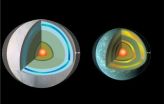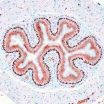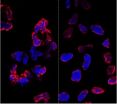(Press-News.org) New research has uncovered how a complex protein pivotal in the development of cancer, viral infection and autoimmune diseases is activated. The discovery answers a key question about one of the most widely-researched proteins in human biology, which has been the subject of tens of thousands of research papers and millions of pounds in research funding.
Jiazhen Zhang, a research student in Professor Sir Philip Cohen's laboratory at the University of Dundee, uncovered how the protein complex, called NF-κB, is activated. The results are published today in the Biochemical Journal.
NF-κB (nuclear factor kappa-light-chain-enhancer of activated B cells) is a protein complex that controls transcription of DNA. NF-κB is found in almost all animal cell types and plays a key role in regulating the immune response to infection. Incorrect regulation of NF-κB has been linked to cancer, inflammatory, and autoimmune diseases, septic shock, viral infection, and improper immune development.
"NF-κB has been the subject of a vast amount of research for many years as it plays a critical role in inflammatory diseases and cancer," said Sir Philip. "It has been known for some time that the protein is activated by a kinase called IKKβ but there has been split opinion with regards to how the kinase itself is switched on.
"We have confirmed that another kinase, TAK1, is involved, but surprisingly it isn't sufficient to switch on IKKβ. Two other events need to happen in addition, namely the formation of an unusual type of ubiquitin chain and its attachment to IKKβ and then the addition of a second phosphate group on to IKKβ which remarkably is carried out by IKKβ itself. It is only then that IKKβ becomes competent to switch on NF-κB.
"This is complex biochemistry but working out the details of how proteins are switched on and off is how new ways to develop improved drugs to treat disease are identified. For example, the enzyme that makes the ubiquitin chains needed to activate IKKβ could now be targeted to develop a drug to treat inflammatory diseases."
The research was carried out in the Medical Research Council Protein Phosphorylation and Ubiquitylation Unit (MRC-PPU) at Dundee.
Peter Shepherd, Chair of the Biochemical Journal Editorial Board, said, "This signalling pathway is critical for a wide range of cellular responses, particularly stress responses. Understanding how this pathway is regulated is hugely important, and this paper finally clarifies one of the key steps in this process. This is important in not only understanding the disease process, but in the quest to develop new therapies that target this signalling pathway."
INFORMATION: END
Research reveals how key controller protein is switched on
2014-07-10
ELSE PRESS RELEASES FROM THIS DATE:
Mouse study: Natural birth may strengthen the immune system
2014-07-10
A number of studies suggest that children delivered by Caesarean section have a different intestinal flora than children delivered by natural birth. But it is still unknown why this is the case and what it means for the immune system. Researchers from the Faculty of Health and Medical Sciences therefore decided to scrutinise the impact of birth on the development of the immune system in a study of newborn mouse pups.
The study shows that pups delivered by Caesarean section had developed a lower number of cells that strengthen the immune system, says Camilla Hartmann ...
Vasectomy may increase risk of aggressive prostate cancer
2014-07-09
Boston, MA -- Vasectomy was associated with a small increased risk of prostate cancer, and a stronger risk for advanced or lethal prostate cancer according to a new study from Harvard School of Public Health (HSPH). The researchers found that the association remained even among men who received regular PSA screening, suggesting the increased risk of lethal cancer cannot be explained by diagnostic bias. It is the largest and most comprehensive study to date to look at the link between vasectomy and prostate cancer.
The study appears online July 7, 2014 in Journal of Clinical ...
Bacteria found in bladders of healthy women differ from those in women with incontinence
2014-07-09
Bacteria found in the bladders of healthy women differ from bacteria in women with a common form of incontinence, according to researchers from Loyola University Chicago Stritch School of Medicine.
These findings, published July 9, 2014, in the American Society for Microbiology's online journal mBio, suggest that bacterial communities may play a role in female urinary health.
"Urgency urinary incontinence (UUI) is a common, yet poorly understood, condition with symptoms similar to urinary tract infections," said Alan Wolfe, PhD, co-investigator and professor of Microbiology ...
NASA finds friction from tides could help distant earths survive, and thrive
2014-07-09
As anybody who has started a campfire by rubbing sticks knows, friction generates heat. Now, computer modeling by NASA scientists shows that friction could be the key to survival for some distant Earth-sized planets traveling in dangerous orbits.
The findings are consistent with observations that Earth-sized planets appear to be very common in other star systems. Although heat can be a destructive force for some planets, the right amount of friction, and therefore heat, can be helpful and perhaps create conditions for habitability.
"We found some unexpected good news ...
NASA MESSENGER and STEREO measurements open new window into high-energy processes on the sun
2014-07-09
Understanding the sun from afar isn't easy. How do you figure out what powers solar flares – the intense bursts of radiation coming from the release of magnetic energy associated with sunspots – when you must rely on observing only the light and particles that make their way to near-Earth's orbit?
One answer: you get closer. NASA's MESSENGER spacecraft -- which orbits Mercury, and so is as close as 28 million miles from the sun versus Earth's 93 million miles -- is near enough to the sun to detect solar neutrons that are created in solar flares. The average lifetime for ...
New recreational travel model to help states stop firewood assisted insect travel
2014-07-09
RESEARCH TRIANGLE PARK, NC, July 9, 2014 – The spread of damaging invasive forest pests is only partially powered by the insects' own wings. People moving firewood for camping can hasten and widen the insects' spread and resulting forest destruction. A new U.S. Forest Service study gives state planners a tool for anticipating the most likely route of human-assisted spread they can use to enhance survey and public education efforts.
The study, "Using a Network Model to Assess Risk of Forest Pest Spread via Recreational Travel," was published July 9 in the journal PLOS ...
CNIO scientists discover that pluripotency factor NANOG is also active in adult organisms
2014-07-09
Scientists from the Spanish National Cancer Research Centre (CNIO) have discovered that NANOG, an essential gene for embryonic stem cells, also regulates cell division in stratified epithelia—those that form part of the epidermis of the skin or cover the oesophagus or the vagina—in adult organisms. According to the conclusions of the study, published in the journal Nature Communications, this factor could also play a role in the formation of tumours derived from stratified epithelia of the oesophagus and skin.
The pluripotency factor NANOG is active during just two days ...
No extra mutations in modified stem cells, study finds
2014-07-09
LA JOLLA-The ability to switch out one gene for another in a line of living stem cells has only crossed from science fiction to reality within this decade. As with any new technology, it brings with it both promise--the hope of fixing disease-causing genes in humans, for example--as well as questions and safety concerns. Now, Salk scientists have put one of those concerns to rest: using gene-editing techniques on stem cells doesn't increase the overall occurrence of mutations in the cells. The new results were published July 3 in the journal Cell Stem Cell.
"The ability ...
Hunting gives deer-damaged forests in state parks a shot at recovery
2014-07-09
WEST LAFAYETTE, Ind. - Regulated deer hunts in Indiana state parks have helped restore the health of forests suffering from decades of damage caused by overabundant populations of white-tailed deer, a Purdue study shows.
A research team led by Michael Jenkins, associate professor of forest ecology, found that a 17-year-long Indiana Department of Natural Resources policy of organizing hunts in state parks has successfully spurred the regrowth of native tree seedlings, herbs and wildflowers rendered scarce by browsing deer.
Jenkins said that while hunting may be unpopular ...
Protein pushes breast cancer cells to metastasize
2014-07-09
Using an innovative tool that captures heretofore hidden ways that cells are regulated, scientists at Rockefeller University have identified a protein that makes breast cancer cells more likely to metastasize.
What's more, the protein appears to trigger cancer's spread in part by blocking two other proteins that are normally linked to neurodegeneration, a finding that suggests these two disease processes could have unexpected ties.
The study, which appears in the July 10 issue of Nature, points to the possibility of new cancer therapies that target this "master regulator" ...




